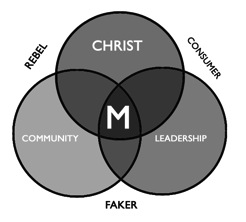Different churches define membership different ways. My local church defines it by the union of four committed relationships: to Christ (“I believe”), to church leadership (“I support”), to church community (“I belong”), and to the unchurched (“I go”). We could say if one is deeply committed to the first relationship (Christ) the others would take care of themselves. However, we find it helpful to make distinctions relationally because it allows us not only to articulate what membership looks like but also what it doesn’t look like. For example, to be uncommitted to one of the three different relationships that make up the church (Christ, community, leadership) will produce one of three frustrating relationships:

The Rebel
This person commits to community and to Christ but not the leadership. He wants to be a part of small group and engage in worship of Christ at a service but rejects the direction of the elders. He subordinates the mission, vision, and values of the local church to his own personal mission and values. In the end, these individuals promote an adversarial relationship with the church, specifically with the church leadership, and can easily become the source of disputes, complaints, and a disgruntled spirit in the congregation.
The Consumer
This individual commits to Jesus in salvation and the mission, vision, and values of the leadership, but doesn’t want to be engaged in the church community. He resists or refuses fellowship, because to enter into community is to relinquish power to control the terms of the relationship. In other words, these individuals have a transactional relationship with the church. This individual wants from the church what he refuses to give. He treats the church not as parishioner, but as consumer.
The Faker
This person assumes since he is good at checking off a bunch of religious boxes he merits God’s favor and salvation. As such, it is easy for him to commit church leadership because he finds his security in his ability to perform responsibilities, and it’s also easy to commit to community because he is comfortable in religious environments where he compares his spirituality with other people. Unfortunately, these individuals are not truly seeking to grow their relationship with Christ and glorify God but to further personal agendas such as expanding their business clientele or search for a spouse. Ultimately, they have a utilitarian relationship to the church.
Rebels, Consumers, and Fakers are people who desire membership but adamantly and steadfastly reject commitment to one or more of the four relationships. They aren’t ready for membership but should examine where repentance needs to take place because adversarial, transactional, and utilitarian relationships only hurt the church. We must also remind ourselves this is about membership not involvement or attendance in the local church. There can be tons of people in the congregation which cannot presently commit to the four relationships. They may be spiritual seekers who simply want to know more about Jesus and the gospel. Others may desire to better understand our mission and values. Still others may need more time dissecting the church’s essential beliefs to see if that’s what they believe. All of us are in process. None of us have arrived. What this tells us is that while some are ready and willing to embrace church membership, others may need more time in the journey. However, if one desires membership, the call is to fully embrace four relationships – Christ, his local leadership, his local community, and the unchurched.

1 thought on “Three Inadequate Relationships concerning Church Membership”
This post has bothered me since I first read it the other day.
Committing to community in the church membership sense is MUCH harder than it sounds. How do you become “committed to the community”? Join a small group? Maybe, but what if you don’t have anything in common with your group? CCCC’s group link is basically a random process. The only thing that brings people in the group together might be that they are seeking God. Is this enough to actually forge a long term relationship? Maybe, maybe not. So then, how does a new person who walks into the church “belong”? I’m sure that most of the leadership of CCCC doesn’t remember or can’t relate to what it might feel like to be in the in-between time. Not brand new, but not belonging yet.